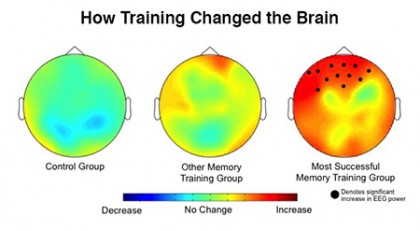Johns Hopkins study shows how brain training, if correctly targeted, can enhance cognitive and brain performance
_________________________________________________________________
This training exercise boosts brain power, Johns Hopkins researchers say (Johns Hopkins release)
“One of the two brain-training methods most scientists use in research is significantly better in improving memory and attention, Johns Hopkins University researchers found. It also results in more significant changes in brain activity.
Though this exercise didn’t make anyone smarter, it greatly improved skills people need to excel at school and at work. These results, published this week by the Journal of Cognitive Enhancement, suggest it’s possible to train the brain like other body parts—with targeted workouts.
“People say cognitive training either works or doesn’t work. We showed that it matters what kind of training you’re doing,” said lead author Kara J.  Blacker, a former Johns Hopkins post-doctoral fellow in psychological and brain sciences…Scientists trying to determine if brain exercises make people smarter have had mixed results. Johns Hopkins researchers suspected the problem wasn’t the idea of brain training, but the type of exercise researchers chose to test it…
Blacker, a former Johns Hopkins post-doctoral fellow in psychological and brain sciences…Scientists trying to determine if brain exercises make people smarter have had mixed results. Johns Hopkins researchers suspected the problem wasn’t the idea of brain training, but the type of exercise researchers chose to test it…
The researchers found that the group that practiced what’s known as a “dual n‑back” exercise showed a 30 percent improvement in their working memory. That was nearly double the gains made by the group working with the other common task, known as “complex span.” The dual n‑back group also showed significant changes in brain activity in the prefrontal cortex, the critical region responsible for higher learning.”
The Study
N‑back Versus Complex Span Working Memory Training (Journal of Cognitive Enhancement)
- From the abstract: Working memory (WM) is the ability to maintain and manipulate task-relevant information in the absence of sensory input. While its improvement through training is of great interest, the degree to which WM training transfers to untrained WM tasks (near transfer) and other untrained cognitive skills (far transfer) remains debated and the mechanism(s) underlying transfer are unclear…Participants completed adaptive training on either a dual n‑back task, a symmetry span task, or on a non-WM active control task. We found evidence of near transfer for the dual n‑back group; however, far transfer to a measure of fluid intelligence did not emerge. Recording EEG during a separate WM transfer task, we examined group-specific, training-related changes in alpha power, which are proposed to be sensitive to WM demands and top-down modulation of WM. Results indicated that the dual n‑back group showed significantly greater frontal alpha power after training compared to before training, more so than both other groups. However, we found no evidence of improvement on measures of relational WM for the dual n‑back group, suggesting that near transfer may not be dependent on relational WM. These results suggest that dual n‑back and complex span task training may differ in their effectiveness to elicit near transfer as well as in the underlying neural changes they facilitate.
The Study in Context
- Can brain training work? Yes, if it meets these 5 conditions
- What are cognitive abilities and how to boost them?
- Solving the Brain Fitness Puzzle Is the Key to Self-Empowered Aging
- Five reasons the future of brain enhancement is digital, pervasive and (hopefully) bright
- Join the 2017 SharpBrains Virtual Summit: Brain Enhancement in the Digital Age (December 5–7th, 2017)


